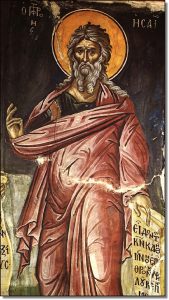For centuries it has been common to chant or sing the text called Rorate Caeli, or the Advent Prose during Masses and other services in Advent. The complete text is assembled with passages from different chapters by the prophet Isaiah. When sung in a liturgical setting, the first two lines of the text are often treated as an antiphon: the passage is chanted at the beginning and end of the entire text and at the end of each stanza by the entire choir and congregation.
Here is an English translation:
Drop down, ye heavens, from above,
and let the skies pour down righteousness.
Be not wroth very sore, O Lord,
neither remember iniquity for ever:
the holy cities are a wilderness,
Sion is a wilderness,
Jerusalem a desolation:
our holy and our beautiful house,
where our fathers praised thee.

We have sinned, and are as an unclean thing,
and we all do fade as a leaf:
and our iniquities, like the wind, have taken us away;
thou hast hid thy face from us:
and hast consumed us, because of our iniquities.
Ye are my witnesses, saith the Lord,
and my servant whom I have chosen;
that ye may know me and believe me:
I, even I, am the Lord, and beside me there is no Saviour:
and there is none that can deliver out of my hand.
Comfort ye, comfort ye, my people,
my salvation shall not tarry:
I have blotted out as a thick cloud thy transgressions:
Fear not, for I will save thee:
for I am the Lord thy God,
the Holy One of Israel, thy Redeemer.
Here is the traditional chant associated with this text, sung in English by the Choir of St. Mark’s Church Regent’s Park, London. (At this link you may download a copy of the text and chant in modern musical notation.)
One of the best known choral settings of this text in English is the 1979 composition by Richard Lloyd (b. 1933) who served as organist and choir master at Hereford Cathedral and Durham Cathedral. His setting exploits the vast, reverberant spaces of cathedrals and the pure sound of well-trained treble voices, accompanied by simple and delicate lines from a great pipe organ. It is sung here in a classic recording by the Choir of St. John’s College, Cambridge, conducted by Christopher Robinson.
In 2005, the English composer Judith Weir (b. 1954) arranged an abbreviated form of this chant for a cappella choir. It is performed here by the Choir of Jesus College, Cambridge, directed by Mark Williams.